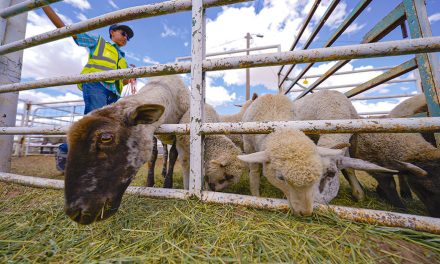
Navajo-Gallup water project bracing for cuts
WINDOW ROCK
The Navajo Nation is facing funding shortfall for the Navajo-Gallup Water Supply pipeline project.
The Resources and Development Committee held a leadership meeting on Tuesday to discuss this issue and what actions people who are involved with the project need to take.
Michelle Brown-Yazzie, assistant attorney general of the Department of Justice’s Water Rights Unit, said there have been necessary amendments made to the project to address the cost overrun.
She said these amendments were made between the project partners – the city of Gallup, state of New Mexico and the Jicarilla Apache Nation.
Brown-Yazzie said there is a need to increase the current authorization of $1.3 billion by $447 million, an amount recommended by the Navajo Nation. However, she said the Bureau of Reclamation’s number was a little different from the Nation’s number.
“We’re asked for the authorization to be increased to $1.795 billion,” Brown-Yazzie said. “The difference between Reclamation’s number and the Navajo Nation’s number is that the Navajo Nation is including a contingency amount to ensure that we do not have to go back and request additional funding.
“We want to make sure this is going to be enough to complete the project,” she said.
Construction for the pipeline began in June 2012 and was expected to complete in 2024. Because of funding shortfalls and delays in construction, Brown-Yazzie said part of the amendment is also to extend the deadline for completion by an additional five years. This means the pipeline would be completed in 2029.
Once constructed, the project will divert 37,376 acre-feet of water annually from the San Juan River Basin and convey it through a 300-mile pipeline, 19 pumping plants, and two other water treatment plants, to the eastern section of the Nation, southern Jicarilla Apache Nation, and to Gallup.
“We were approached by Public Service Company of New Mexico back in late 2018 to see if we would be interested in incorporating the San Juan Generating Station river diversion and water storage facilities into the project,” said Pat Page, manager of the U.S. Bureau of Reclamation’s Four Corners office.
Page said an analysis, approved by the state of New Mexico, Navajo Nation, and the Department of Interior, was done to see if these facilities would be beneficial and that no red flags came up.
He also said these facilities would be in the best interest of the project because of benefits such as capital cost savings and a reduction in the complexity of the annual operation and maintenance, expenditures, and costs.
The reason for a deadline extension would be because the Water Rights Unit decided to go forward with the incorporation of the facilities, allowing the Reclamation to complete necessary environmental compliance for the acquisition of the facilities.
It would also give the unit time to negotiate contracts to acquire the facilities, complete any upgrades and enhancements, and tie the design and construction into the infrastructure project.
Brown-Yazzie said there are other proposed amendments such as operations and maintenance waivers. She said in the legislation, there is currently an O&M waiver for the Navajo Nation for up to 10 years. However, it is not mandatory and is instead discretionary.
In the proposed amendments, the Water Rights Unit is asking that the waivers be mandatory and extended from 10 to 15 years.
“The current law does not have such O&M waivers for Jicarilla Apache Nation or for the city of Gallup and the proposed amendments do include mandatory 10-year waivers for the Jicarilla and for Gallup,” Brown-Yazzie said.
She said these waivers were included because it would assist the project partners in providing low-cost services to the customer base. This would benefit Navajo tribal members receiving water at a low and reasonable cost.
She said Congress could deny this and remove the waivers from the amendments.
“We’re putting together a plan,” said Delegate Rickie Nez, the RDC chairman, “the plan that we will present to congressional leaders, a plan that will touch their hearts and minds and say ‘Navajos need water.’
“Over 40 percent of Navajo Nation has no water, they’ll think about this,” he said. “And because of that, COVID-19 continues to be persistent on the Navajo Nation and continues to rise.”
Nez said a follow-up on the requested amendments would happen once it is back on the RDC agenda for approval or if any supporting legislation is needed.








 Highway 264,
Highway 264, I-40, WB @ Winslow
I-40, WB @ Winslow